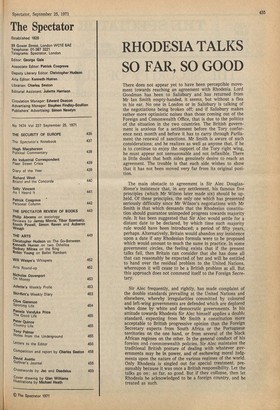RHODESIA TALKS SO FAR, SO GOOD
There does not appear yet to have been perceptible movement towards reaching an agreement with Rhodesia. Lord Goodman has been to Salisbury and has returned from Mr Ian Smith empty-handed, it seems, but without a flea in his ear. No one in London or in Salisbury is talking of the negotiations being broken off; and if Salisbury makes rather more optimistic noises than those coming out of the Foreign and Comonwealth Office, that is due to the politics of the situation in the two countries. The British government is anxious for a settlement before the Tory conference next month and before it has to carry through Parliament the renewal of sanctions. Mr Smith is aware of such considerations; and he realizes as well as anyone that, if he is to continue to enjoy the support of the Tory right wing, he must appear not unreasonable and not inflexible. There is little doubt that both sides genuinely desire to reach an agreement. The trouble is that each side wishes to show that it has not been moved very far from its original position.
The main obstacle to agreement is Sir Alec DouglasHome's insistence that, in any settlement, his famous five principles (which Mr Wilson later made six) should be upheld. Of these principles, the only one which has presented seriously difficulty since Mr Wilson's negotiations with Mr Smith is that which demands that the Rhodesian constitution should guarantee unimpeded progress towards majority rule. It has been suggested that Sir Alec would settle for a distant date to be declared, by which time such majority rule would have been introduced; a period of fifty years, perhaps. Alternatively, Britain would abandon any insistence upon a date if any Rhodesian formula were to be proposed which would amount to much the same in practice. In some government circles, the feeling exists that if the present talks fail, then Britain can consider that she has done all that can reasonably be expected of her and will be entitled to hand over the residual problem to the United Nations, whereupon it will cease to be a British problem at all. But this approach does not commend itself to the Foreign Secretary.
Sir Alec frequently, and rightly, has made complaint of the double standards prevailing at the United Nations and elsewhere, whereby irregularities committed by coloured and left-wing governments are defended which are deplored when done by white and democratic governments. In his attitude towards Rhodesia Sir Alec himself applies a double standard, expecting from Mr Smith a constitution more acceptable to British progressive opinion than the Foreign Secretary expects from South Africa or the Portuguese territories on the one hand, or from several of the black African regimes on the other. In the general conduct of his foreign and commonwealth policies. Sir Alec maintains the traditional British posture of dealing with whatever governments may be in power, and of eschewing moral judgments upon the nature of the various regimes of the world. Only Rhodesia is singled out for special treatment, presumably because it was once a British responsibility. Let the talks go on : so far, so good. But if they collapse, then let Rhodesia be acknowledged to be a foreign country, and be treated as such.


































 Previous page
Previous page